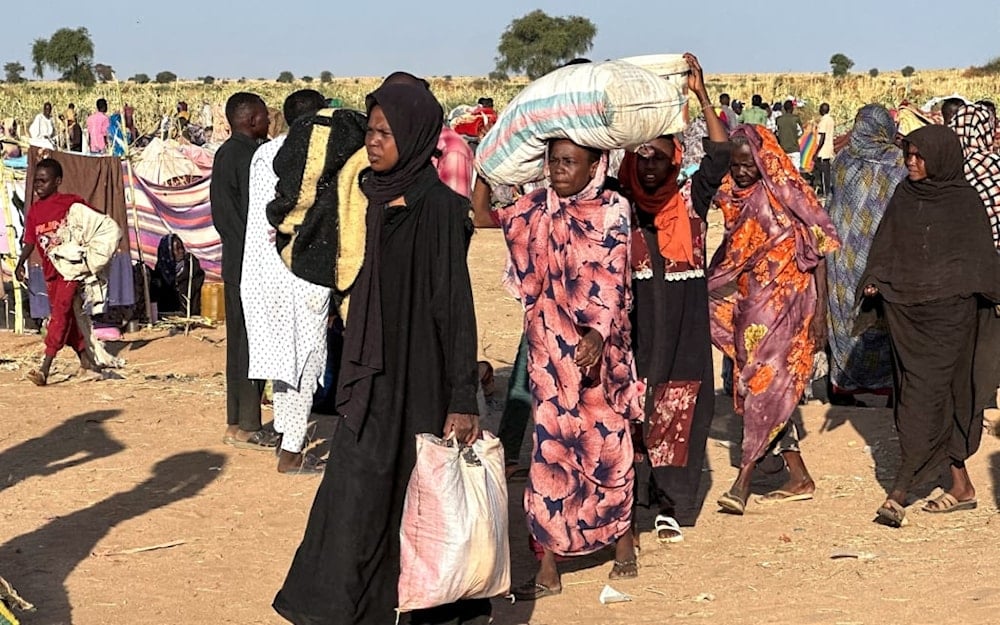'History repeating itself': 36,000+ fled since RSF captured El Fasher
Over 36,000 Sudanese have fled North Kordofan following the RSF's capture of El Fasher, amid escalating battles in Sudan.
-

Displaced Sudanese who fled El Fasher after the city fell to the Rapid Support Forces (RSF) arrive in the town of Tawila in war-torn Sudan's western Darfur region on October 28, 2025 (AFP)
More than 36,000 people have fled Sudan’s Kordofan region, east of Darfur, following the recent capture of El Fasher by the paramilitary Rapid Support Forces (RSF), according to the United Nations' International Organization for Migration (IOM).
The displacement began on October 26, the day El Fasher fell to RSF forces, and continued through October 31.
An estimated 36,825 people have left five localities in North Kordofan, with most fleeing on foot. Many have sought refuge in Tawila, a town west of El Fasher already hosting more than 652,000 displaced individuals, according to the UN.
Read more: RSF produces banned chemicals under foreign expert supervision: Report
Famine spreads to two more areas in Sudan's west, south
A UN-backed report revealed on Monday that famine has spread to two more areas of war-torn Sudan, including the western city of El Fasher.
The Rome-based Integrated Food Security Phase Classification said famine had been confirmed in El Fasher and the besieged city of Kadugli in South Kordofan state, adding that twenty more areas in the Darfur and Kordofan regions were also at risk of famine.
RSF, Sudanese Armed Forces compete for control in Kordofan
The region of El Fasher, strategically located between Darfur and the Khartoum-Riverine corridor, has become the latest flashpoint in the Sudan war between the Sudanese Armed Forces (SAF) and RSF.
Reports from North Kordofan on Monday indicated an increased presence of both RSF and SAF troops across towns and villages. The two forces are now vying for control of El Obeid, the capital of North Kordofan and a vital logistics and military hub linking Darfur to Khartoum. The city is also home to a key airport.
Late Sunday, RSF claimed control of the town of Bara, north of El Obeid. “Today, all our forces have converged on the Bara front here,” an RSF member stated in a video shared by the group.
Read more: UAE directly funded RSF, leading to fall of El-Fasher: Sudan
Rising violence, ethnic atrocities
Local residents have described a sharp increase in military activity. Suleiman Babiker, a resident of Um Smeima, west of El Obeid, told AFP of a surge in RSF vehicles since the group’s advance from El Fasher. “We stopped going to our farms, afraid of clashes,” he said.
Another resident, who requested anonymity for security reasons, noted a similar buildup of SAF vehicles and weapons west and south of El Obeid over the past two weeks.
Martha Pobee, assistant UN secretary-general for Africa, warned of "large-scale atrocities" and "ethnically motivated reprisals" by RSF fighters in Bara, drawing parallels with patterns of violence previously seen in Darfur.
RSF has been accused of committing mass killings, sexual violence, and abductions against non-Arab ethnic groups following the fall of El Fasher.
International appeals for ceasefire, humanitarian access
Pope Leo on Sunday called for an immediate ceasefire in Sudan and the opening of humanitarian corridors. He condemned attacks on civilians and the obstruction of humanitarian aid, describing the situation as causing "unacceptable suffering".
Sudan’s ambassador to Egypt, Imadeldin Mustafa Adawi, also accused RSF of committing war crimes in El Fasher. He stated that the Sudanese government would not negotiate with the paramilitary group and urged the international community to designate RSF as a terrorist organization.
As the conflict deepens, the humanitarian crisis in Sudan, particularly in Kordofan and Darfur, continues to escalate, with civilians bearing the brunt of the war.
Read more: RSF’s ‘Abu Lulu’ arrest branded a PR hoax amid El Fasher carnage
Red Cross states history is repeating itself
Mirjana Spoljaric, the head of the International Committee of the Red Cross, stated to Reuters that history is repeating itself in Darfur, following the reports of mass killing after the fall of El Fashir.
She further stated that the situation is "horrific" during a weekend interview with the news agency during a visit to Riyadh.
"It's history repeating, and it becomes worse every time a place is taken over by the other party," she said, adding that the ICRC was "extremely concerned" regarding information on massacres at the Saudi hospital, the last known functioning hospital in El Fashir.
ICRC staff reported to have heard reports that people fleeing the city "sometimes collapsing and even dying out of exhaustion or because of their wounds," according to Spoljaric as cited by Reuters.
The situation is "absolutely beyond what we can consider acceptable," she added.
Read more: Sudan will be united whether by peace or by war: RSF chief
When asked about her messaging to foreign backers of the conflict, Spoljaric told Reuters, "Especially those states that have an influence on parties to the conflict are under responsibility to do the necessary to restrain them and to make sure that they protect civilian populations."
She added that the world was living through a "decade of war," with armed conflicts doubling over the past 15 years to roughly 130.
Spoljaric further stated to Reuters that the surge of conflicts was being increased by evolving military technology, highlighting drones as an example, which "create an environment where nowhere is safe anymore."

 5 Min Read
5 Min Read








